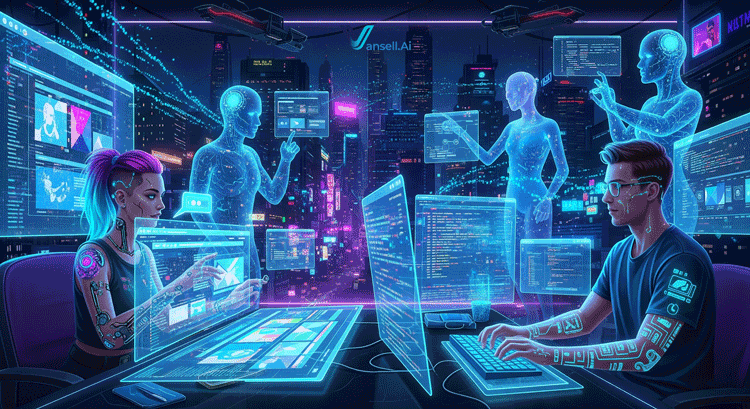AI Tools for Web Design and Coding
Discover how AI is transforming the way we design, develop, and optimize websites in 2025.

- hirbodchoobak@gmail.com
- ⏱ 8 min read
AI Takes the Lead in Web Design and Coding
Over the past few years, artificial intelligence (AI) has moved from being a futuristic concept to a real, everyday tool that is shaping industries. One field that has experienced an especially significant transformation is web design and coding. In 2025, AI-powered tools have become essential for designers, developers, and even business owners with little or no coding experience.
The integration of AI in this field doesn’t just mean automating repetitive tasks—it’s about enhancing creativity, speeding up workflows, and creating better user experiences. Whether you’re building a personal portfolio or managing a large-scale e-commerce site, AI can help you work smarter, not harder.
In this article, we’ll explore the top AI tools for web design and coding, how they work, and how they are reshaping the industry.
1. AI in Web Design: A Game-Changer for Creativity
AI is no longer just about data processing; it’s now a creative partner for designers. By analyzing design trends, user preferences, and industry standards, AI-powered design platforms can create beautiful layouts in seconds.
How AI Improves the Creative Process:
Automated Design Suggestions – Tools like Wix ADI or Bookmark AiDA ask you a few questions about your brand and automatically create a design tailored to your needs.
Smart Color and Font Pairing – AI systems can suggest color schemes and typography combinations that follow modern design principles.
Image Generation and Editing – Platforms like Adobe Firefly or DALL·E 3 allow designers to generate custom graphics without the need for expensive photo shoots.
Example:
Imagine you want a website for a bakery. Instead of spending hours selecting fonts, layouts, and images, an AI tool can deliver a near-final design in minutes, which you can then tweak to perfection.
2. AI in Coding: Faster, Cleaner, Smarter
Developers are increasingly relying on AI tools to help them write cleaner, more efficient code in less time.
Popular AI Coding Assistants:
GitHub Copilot – Suggests lines of code and entire functions as you type.
Tabnine – Learns your coding style and improves suggestions over time.
Codeium – Free AI-powered code completion with multiple language support.
Key Benefits for Developers:
Error Reduction – AI can detect bugs before you even run the code.
Speed – Code completion tools reduce development time by up to 50%.
Learning Support – AI assistants explain unfamiliar code snippets, making them great for beginners.
Example:
If you need to create a responsive navigation bar, AI can provide the HTML, CSS, and JavaScript in seconds—ready for you to customize.
3. Combining AI Design and AI Coding
In the past, web design and coding were separate disciplines, but AI tools are blurring the lines. Platforms now offer design-to-code conversion, allowing a visual mockup to instantly become functional code.
Top Tools for Design-to-Code:
Uizard – Turns sketches and wireframes into interactive designs.
Figma with AI Plugins – Generates code snippets directly from design components.
TeleportHQ – Converts Figma designs into production-ready HTML, CSS, and React code.
This is a huge advantage for startups and freelancers, as it eliminates the need for a large design and development team.
4. AI for User Experience (UX) Optimization
Good design and functional code are just part of the equation—user experience is where websites win or lose visitors. AI tools can analyze user behavior in real time and make adjustments automatically.
AI-Powered UX Tools:
Hotjar with AI Insights – Tracks where users click, scroll, and leave.
Optimizely AI – Runs automated A/B tests to find the best layouts and content.
Crazy Egg Smart Recommendations – Suggests design changes to improve engagement.
Example:
If an AI tool detects that users aren’t clicking your call-to-action button, it might suggest changing its position, size, or color—without you having to guess.
5. AI in SEO for Web Development
Even the best-designed site won’t succeed without visibility. AI SEO tools help you rank higher in search results by optimizing content, structure, and speed.
Best AI SEO Tools in 2025:
Surfer SEO – Creates AI-optimized content outlines.
Frase.io – Suggests keyword-rich content improvements.
SEMrush AI Writing Assistant – Checks your writing for SEO best practices.
AI can also optimize image alt tags, meta descriptions, and URL structures automatically—saving hours of manual work.
6. The Future: AI and No-Code Development
In 2025, no-code platforms combined with AI are making it possible for anyone to launch a website without touching a single line of code. This democratization of web development means that entrepreneurs, small business owners, and creatives can bring their ideas to life faster than ever.
Notable AI-Powered No-Code Platforms:
Webflow AI – Converts natural language prompts into fully designed pages.
Durable.co – Builds complete business websites in under 30 seconds.
10Web AI Builder – Uses AI to replicate and improve existing websites.
7. Challenges and Limitations of AI in Web Design
While AI offers incredible benefits, it’s not perfect. Some limitations include:
Lack of Originality – AI tends to base designs on existing patterns.
Over-Automation – Too much AI input can make websites look generic.
Dependence on Training Data – If the AI is trained on outdated trends, your design might feel old-fashioned.
That’s why the human touch is still essential for creativity and brand uniqueness.
Conclusion: A New Era for Web Design and Development
AI tools for web design and coding have completely transformed how websites are created, maintained, and optimized. From generating custom layouts to writing clean, efficient code, these tools empower both professionals and beginners to build high-quality websites faster than ever before.
The future promises even more innovation—voice-based website creation, real-time AI debugging, and AI-driven personalization at scale. For anyone in the digital space, learning to leverage AI is no longer optional—it’s the key to staying competitive.https://vansell.ai/web-development

